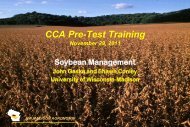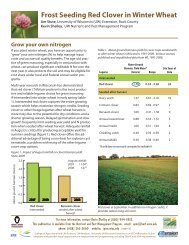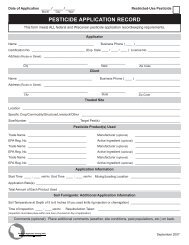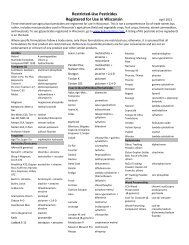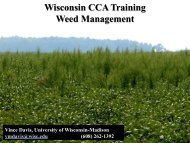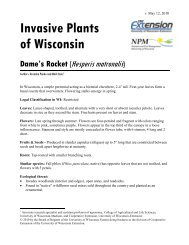IPM Crop Scouting Weed Guide - PDF
IPM Crop Scouting Weed Guide - PDF
IPM Crop Scouting Weed Guide - PDF
You also want an ePaper? Increase the reach of your titles
YUMPU automatically turns print PDFs into web optimized ePapers that Google loves.
Identification of Common Wisconsin <strong>Weed</strong>s<br />
Annual Broadleaves<br />
BUCKWHEAT FAMILY<br />
Wild buckwheat (51)*<br />
Polygonumn convolvulus<br />
Cotyledon: oblong oval with granular waxy surface<br />
Ocrea: at leaf axils; small<br />
Stems: trailing vines<br />
Leaves: heart-shaped with pointed tips<br />
Flowers: greenish-white, small and inconspicuous<br />
Seeds: 3-sided<br />
* indicates the page in <strong>Weed</strong>s of the North Central States that describes the plant<br />
BUCKWHEAT FAMILY<br />
Pennsylvania smartweed (52)<br />
Polygonum pensylvanicum<br />
Cotyledon: lanceolate to oblong, rounded tips<br />
Ocrea: at leaf axils; smooth top<br />
Stems: reddish, branched swollen nodes<br />
Leaves: rounded at base; pointed at tip<br />
Flowers: pink, terminal flower clusters<br />
Other: seed black, shiny, flattened, circular with<br />
pointed tip<br />
BUCKWHEAT FAMILY<br />
Ladysthumb smartweed (52)<br />
Polygonum persicaria<br />
Cotyledon: lanceolate to oblong, rounded tips<br />
Ocrea: at leaf axils; hairy top<br />
Stem: reddish with swollen nodes branched<br />
Leaves: pointed at both ends, often have “thumb<br />
print”<br />
Flowers: pink, terminal flower clusters<br />
Other: seeds black, most triangular<br />
Wild buckwheat seedling<br />
Wild buckwheat ocrea Wild buckwheat plant<br />
Penn. smartweed ocrea<br />
Penn. smartweed seeds Pennsylvania smartweed flowering plants<br />
Ladysthumb ocrea<br />
Ladysthumb seeds Ladysthumb smartweed plants
GOOSEFOOT FAMILY<br />
Common lambsquarters (57)<br />
Chenopodium album<br />
Cotyledon: linear, small<br />
Leaves: often have whitish, ‘mealy’<br />
Covering: shape is triangular or “goosefoot” shaped<br />
Stems: have reddish streaks, branched<br />
Seed: shiny, black, disk-shaped, 1/16 inch in<br />
diameter<br />
Other: many biotypes, some resistant to<br />
herbicides<br />
PIGWEED FAMILY<br />
Redroot pigweed (65)<br />
Amaranthus retroflexus<br />
Cotyledon: linear, smooth<br />
Root: often reddish-pink taproot<br />
Leaves (stems): notch in tip of first leaves; finely pubescent;<br />
reddish-purple color on underside of leaves<br />
Seedhead: somewhat spiny, small, black, shiny seeds<br />
Other: also called rough pigweed<br />
PIGWEED FAMILY<br />
Smooth pigweed (64)<br />
Amaranthus hybridus<br />
Cotyledon: linear, smooth<br />
Root: often reddish-pink taproot<br />
Leaves (stems): generally smooth<br />
Seedheads: longer than redroot pigweed; rarely<br />
branched<br />
Other: resistant biotypes<br />
Lambsquarters seedling<br />
Lambsquarters leaves Lambsquarter flowers<br />
Redroot pigweed seedling<br />
Redroot pigweed stem<br />
Smooth pigweed seeds<br />
Redroot pigweed seedhead<br />
Smooth pigweed stem Smooth pigweed seedhead
PIGWEED FAMILY<br />
Waterhemp<br />
Amaranthus tuberculatus<br />
Cotyledon: linear; egg-shaped<br />
Leaves: nick in tip of first leaves; long-petioled; 3 to<br />
6 in. long;somewhat shiny<br />
Stems: smooth, often with colored stripes<br />
Infloresence: small greenish flowers, male and female<br />
flowers on separate plants<br />
Other: several species of waterhemp in the region;<br />
resistant biotypes<br />
PURSLANE FAMILY<br />
Purslane (71)<br />
Portulaca oleracea<br />
Cotyledon: linear or oblong, smooth<br />
Leaves: fleshy, rounded, opposite<br />
Stems: fleshy, prostrate, reddish, branched<br />
Flowers: 5 yellow petals; small; numerous<br />
Seeds: small, flattened, oval, glossy black<br />
Other: plants can establish from stem pieces<br />
MUSTARD FAMILY<br />
Wild mustard (89)<br />
Brassica kaber<br />
Cotyledon: heart or kidney-shaped; smooth<br />
Leaves (stems): few bristly hairs<br />
Lower leaves: large, triangular and lobed (not to midrib)<br />
Upper leaves: reduced in size; no petioles<br />
Flowers: 4 bright yellow petals<br />
Seed pods: “beak” of seed capsule 1/3 length of whole<br />
capsule; open to release round seeds<br />
Waterhemp seedling<br />
Waterhemp young plant<br />
Purslane seeds<br />
Waterhemp infloresence<br />
Purslane flower Purslane plant<br />
Wild mustard seedpod<br />
Wild mustard stem<br />
Wild mustard stem<br />
Wild mustard flowers
MUSTARD FAMILY<br />
Wild radish (100)<br />
Raphanus raphanistrum<br />
Cotyledon: heart or kidney-shaped, smooth<br />
Lower leaves: rounded lobes often reach to midrib<br />
Leaves (stems): stiff, scattered hairs<br />
Flowers: 4 yellowish-white petals; sometimes with<br />
purplish veins<br />
Seed pods: form constrictions and break into small<br />
segments with seed inside<br />
Other: fruits contaminate oats and barley grain<br />
MUSTARD FAMILY<br />
Shepherd’s purse (91)<br />
Capsella bursa-pastoris<br />
Cotyledon: ovate to rounded<br />
Rosette leaves: starlike branched hairs on upper surface;<br />
leaf lobes point to leaf tip<br />
Stalk (stems): elongated stalk; leaves clasp stem<br />
Flowers: small with 4 white petals<br />
Seed pod: small, triangular-shaped<br />
MUSTARD FAMILY<br />
Field pennycress (104)<br />
Thlaspi arvense<br />
Cotyledon: round, bluish-green<br />
Leaves: rosette and stem leaves; ear-like lobes that<br />
clasp stems on upper leaves<br />
Flowers: flowers with 4 white petals; in clusters<br />
Seed pod: notch in top of pod and flat wing around<br />
edge<br />
Other: garlic-like odor in crushed leaves and<br />
stems<br />
Wild radish lower leaf<br />
Wild radish stem<br />
Young plant<br />
Seed pods<br />
Young plant<br />
Wild radish flowers and seedpods<br />
Shepherd’s purse plant<br />
Seed pods Field pennycress flowers
MALLOW FAMILY<br />
Velvetleaf (122)<br />
Abutilon theophrasti<br />
Cotyledon: round or heart-shaped<br />
Leaves: very large, heart-shaped, softly hairy<br />
Stem: pubescent<br />
Flowers: yellow with 5 petals<br />
Seed capsules: 13-15 segments; resembles “butterprint”<br />
NIGHTSHADE FAMILY<br />
Jimson weed (157)<br />
Datura stramonium<br />
Cotyledon: lanceolate, smooth<br />
Leaves: ovate (egg-shaped) with pointed tip lobes;<br />
wavy margins<br />
Stems: hollow, purplish, and smooth<br />
Flower: white tubular flowers<br />
Seed capsules: spiny, golf ball sized with many seeds<br />
Other: strong, foul odor in leaves and stems;<br />
poisonous<br />
NIGHTSHADE FAMILY<br />
Eastern black nightshade (162)<br />
Solanum ptycanthum<br />
Cotyledon: ovate, smooth, small<br />
Leaves: purplish color on underside; often with<br />
“shot holes”<br />
Stems: erect or spreading; widely branched<br />
Flowers: 5 white reflexed petals<br />
Fruits: green, turning black at maturity;<br />
contaminate harvested products<br />
Velvetleaf seedling<br />
Flower and seed capsule Velvetleaf leaf and flower<br />
Jimson weed flower<br />
Seed capsule<br />
Seedling<br />
Jimson weed plant<br />
Black nightshade flower Black nightshade fruit
NIGHTSHADE FAMILY<br />
Hairy nightshade<br />
Solanum physalifolium<br />
Cotyledon: ovate, hairy<br />
Leaves: ovate to nearly triangular; finely hairy,<br />
especially veins & margins<br />
Stems: finely hairy<br />
Flowers: 3-9 flowers on short stalk; 5-petaled; white<br />
or tinged with purple<br />
Fruit: turns yellowish brown when ripe<br />
GOURD FAMLIY<br />
Bur Cucumber (178)<br />
Sicyos angulatus<br />
Cotyledon: large; spoon-shaped, thick with dense<br />
short hairs<br />
Stems: long, ridged vines; sticky-hairy; branched<br />
tendrils allow plants to climb over crops<br />
Leaves: 3 to 5 shallow lobes (pentagon-shaped),<br />
alternate, petioled<br />
Flowers: male and female flowers arise at separate<br />
axils; 5 greenish-white fused sepals and<br />
petals<br />
Fruits: in clusters of 3 to 20 egg-shaped, barbed,<br />
prickly pods; each pod with one seed<br />
COMPOSITE FAMILY<br />
Common ragweed (181)<br />
Ambrosia artemisiifolia<br />
Cotyledon: oval to spatulate, thick<br />
Leaves: lacy, finely divided, opposite initially, then<br />
alternate; first leaves with 5 lobes<br />
Stems: rough, hairy and branched<br />
Flowers: male flowers in terminal clusters; female<br />
flowers in leaf axils<br />
Hairy nightshade flowers<br />
Hairy nightshade stem<br />
Bur cucumber seedling<br />
Bur cucumber flowers<br />
Seedling<br />
Flowers<br />
Hairy nightshade fruit<br />
Bur cucumber plant<br />
Common ragweed plant
COMPOSITE FAMILY<br />
Giant ragweed (183)<br />
Ambrosia trifida<br />
Cotyledon: oval to spatulate<br />
Leaves: opposite, large and 3-5 lobed; upper<br />
leaves often simple; roughly hairy<br />
Stems: woody and 1-2 inches thick; tough, hairy;<br />
6-14 feet tall<br />
Flowers: male flowers in terminal clusters; female<br />
flowers in leaf axils<br />
COMPOSITE FAMILY<br />
Horseweed (204)<br />
Conyza canadensis<br />
Cotyledon: round to ovate<br />
Leaves: many leaves, no petioles; hairy; entire or<br />
toothed<br />
Stems: covered with bristly hairs; branched at top<br />
Flowers: many small flowers on axillary branches<br />
Other: also called marestail; common in no-till<br />
sites<br />
COMPOSITE FAMILY<br />
Smallflower galinsoga (210)<br />
Galinsoga parviflora<br />
Cotyledon: oval to squarish, hairy; abruptly tapered at<br />
base<br />
Leaves: opposite, toothed<br />
Stems: branched, hairy<br />
Flowers: 4-5 white ray flowers surrounding yellow<br />
disk flowers<br />
Giant ragweed seedling<br />
Giant ragweed leaf Giant ragweed flowers<br />
Horseweed leaves<br />
Horseweed flowers Young horseweed plant<br />
Galinsoga flowers<br />
Young galinsoga plant<br />
Galinsoga plants
COMPOSITE FAMILY<br />
Prickly Lettuce (224)<br />
Lactuca serriola<br />
Cotyledon: ovate to spoon-shaped<br />
First leaves: rosette of pale green leaves; no spines<br />
Later leaves: lobed with spiny edges and spines on<br />
midrib of underside of leaves; leaf bases<br />
clasp the stem<br />
Stems: hollow; top very branched when mature<br />
Flowers: pale yellow flower heads that release<br />
seeds attached to a pappus<br />
Other: leaves and stems with milky sap<br />
COMPOSITE FAMILY<br />
Cocklebur (240)<br />
Xanthium strumarium<br />
Cotyledon: lanceolate, thick<br />
Leaves: large, triangular and lobed; 3 prominent<br />
veins<br />
Stems: rough texture, dark purple spots<br />
Leaves (stems): sandpaper-like textured surface<br />
Flowers: small, male and female separate but borne<br />
together in clusters in axils of upper leaves;<br />
two female flowers are enclosed in each<br />
oval bur<br />
Biennial Broadleaves<br />
COMPOSITE FAMILY<br />
Burdock (187)<br />
Arctium minus<br />
Taproot: large, thick, and fleshy<br />
Rosette leaves: huge with heart-shaped base; white-woolly<br />
below<br />
Leaves: alternate, prominent veins<br />
Stems: tough; much branched<br />
Flowers: red-violet color; 3/4 - 1 inch across<br />
Fruit: a bur with hooked spines<br />
Prickly lettuce stem<br />
Prickly lettuce leaf Prickly lettuce flowers<br />
Cocklebur seedling<br />
Oval bur<br />
Burdock flowerbuds<br />
Burdock burs<br />
Cocklebur leaves<br />
Burdock young plant
COMPOSITE FAMILY<br />
Musk thistle (199)<br />
Carduus nutans<br />
Leaves: smooth, waxy; grey-green margin with a<br />
white, hairless midrib;spiny edges that<br />
extend down stem<br />
Stems: spiny from leaf bases except right below<br />
flower head<br />
Flowers: 1-½ to 2 inches in diameter; rich pink<br />
color; head often tips downward<br />
COMPOSITE FAMILY<br />
Plumeless thistle (198)<br />
Carduus acanthoides<br />
Leaves: leaves deeply divided; hairy esp. lower<br />
surface midrib;decurrent<br />
Stems: spiny from base to flower head due to<br />
decurrent leaves<br />
Flowers: ¾ to 1 ½ inches in diameter; pinkish<br />
COMPOSITE FAMILY<br />
Bull thistle (202)<br />
Cirsium vulgare<br />
Leaves: deeply cut, spiny margins with a wrinkled<br />
surface; hairy<br />
Spines: prominent; needle-like<br />
Stems: spiny with decurrent leaves (extend down<br />
the stem)<br />
Flowers: 1-2 inches in diameter; are flask-shaped;<br />
pink to pink-lavender<br />
Musk thistle flowerbud<br />
Musk thistle leaf Musk thistle flower<br />
Plumeless thistle rosette<br />
Plumeless thistle flowerbuds<br />
Bull thistle rosette<br />
Plumeless thistle flower<br />
Bull thistle stem Bull thistle flower
Perennial Broadleaves<br />
HORSETAIL FAMILY<br />
Horsetail (11)<br />
Equisetum arvense<br />
Spreads: by spores and rhizomes<br />
Fertile stems: stems hollow, not branched; easily<br />
separated joints<br />
Vegetative stems: “leaves” in whorls at joints; looks like small<br />
pine trees<br />
Other: most common in wet areas<br />
BUCKWHEAT FAMILY<br />
Curly dock (55)<br />
Rumex crispus<br />
Taproot: fleshy, branched, and yellow<br />
Ocrea: long; prominent<br />
Basal leaves: 6-12 inches with wavy edges<br />
Stems: smooth, erect, reddish<br />
Flowers: small greenish becoming reddish brown<br />
at maturity, found in dense clusters on<br />
branches at tip of stem<br />
PINK FAMILY<br />
White cockle (74)<br />
Lychnis alba<br />
Leaves: hairy and opposite, with no petiole; softly<br />
hairy<br />
Stems: softly hairy<br />
Flowers: white; male & female parts on separate<br />
plants (dioecious)<br />
Fruit: seed pods with 10 short teeth<br />
Horsetail roots<br />
Horsetail seedheads Horsetail plants<br />
Curly dock leaf<br />
Curly dock seed pods<br />
White cockle stem<br />
White cockle flower<br />
Mature curly dock flowers<br />
White cockle seed pod
MUSTARD FAMILY<br />
Yellow rocket (86)<br />
Barbarea vulgaris<br />
Rosette leaves: pinnate with large terminal lobe<br />
Stem leaves: smooth with waxy surface<br />
Upper leaves: clasp stem<br />
Flowers: 4 yellow petals, similar to wild mustard but<br />
smaller<br />
MUSTARD FAMILY<br />
Hoary alyssum (87)<br />
Berteroa incana<br />
Leaves (stems): grey-green in color; rough hairs on whole<br />
plant<br />
Flowers: white with 4 deeply-divided petals<br />
Fruit: seed pods small with short “beak”<br />
SPURGE FAMILY<br />
Leafy Spurge (118)<br />
Euphorbia esula<br />
Roots: deep and spreading<br />
Stems: smooth<br />
Leaves: alternate, strap-shaped, ¼ inch wide,<br />
usually drooping<br />
Flowers: small and borne above greenish-yellow<br />
bracts<br />
Fruit: explode when ripe, shooting 3 seeds, from<br />
parent plant<br />
Other: all plant parts have milky sap<br />
Yellow rocket leaves<br />
Yellow rocket seed pods Yellow rocket flowers<br />
Young plant<br />
Hoary alyssum flowers<br />
Leafy spurge leaves<br />
Hoary alyssum-upper part of plant<br />
Leafy spurge fruit Leafy spurge plants
DOGBANE FAMILY<br />
Hemp dogbane (134)<br />
Apocynum cannabinum<br />
Roots: deep and branched<br />
Leaves: opposite, narrow and pointed tips<br />
Stems: smooth, reddish<br />
Flowers: 5 greenish white petals that are slightly<br />
longer than green sepals<br />
Fruits: long, slender pods; occur in pairs<br />
Other: all plant parts have milky ap<br />
MILKWEED FAMILY<br />
Common Milkweed (137)<br />
Asclepias syrica<br />
Roots: deep and branched<br />
Leaves: opposite, thick, oblong, rounded tips,<br />
prominent veins<br />
Flowers: pink to white in large many-flowered balllike<br />
clusters at tip of stem and in axils of<br />
upper stems<br />
Other: all plant parts have milky sap<br />
MORNINGGLORY FAMILY<br />
Field bindweed (139)<br />
Convolvulus arvensis<br />
Roots: deep and spreading<br />
Stems: trailing or climbing<br />
Leaves: “arrowhead”-shaped leaves with 3 “points”<br />
Flowers: white or pink, funnel-shaped, 1 inch or less<br />
in diameter, found in axils of leaves<br />
Other: flower stalks have 2 stipules below flowers<br />
Hemp dogbane leaf<br />
Hemp dogbane flowers<br />
Milkweed seed pods<br />
Milkweed flowers<br />
Flower & stalk<br />
Field bindweed flowers<br />
Hemp dogbane plant<br />
Milkweed plant<br />
Field bindweed leaves
MORNINGGLORY FAMILY<br />
Hedge bindweed (140)<br />
Convolvulus sepium<br />
Roots: deep and spreading<br />
Stems: trailing or climbing (similar to field<br />
bindweed)<br />
Leaves: “arrowhead”-shaped leaves with 5 “points”<br />
Flower stalks: no stipules below flowers<br />
Flowers: large, 1 ½ to 2 inches, white or pinkish<br />
PLANTIN FAMILY<br />
Blackseed Plantin (171)<br />
Plantago rugelii<br />
Roots: fibrous, tough<br />
Leaves: in rosette, broad, ovate with 3 to 5<br />
prominent veins; smooth; petioles purplish;<br />
egg-shaped, wavy margins<br />
Flowering stems:leafless with many small inconspicuous<br />
flowers<br />
Other: broadleaf plantain similar but lacks purple<br />
petioles and has smaller leaves<br />
NIGHTSHADE FAMILY<br />
Horsenettle (160)<br />
Solanum carolinense<br />
Root: spreading, deep with adventitious buds<br />
Leaves: with yellow prickles on the petioles, veins<br />
and midribs; hairy; oblong with wavy edges<br />
(like oak leaf)<br />
Stems: with sharp, stout spines; simple or<br />
branched<br />
Flowers: potato-like with 5 fused white to purple<br />
petals; prominent anthers<br />
Fruits: smooth green berries to 0.5” diameter,<br />
becoming yellow; become wrinkled and<br />
hang on plants most of winter<br />
Other: plants poisonous<br />
Hedge bindweed bud<br />
Hedge bindweed flower<br />
Young plantain plant<br />
Blackseed plantain seeds<br />
Horsenettle flower<br />
Horsenettle fruit<br />
Hedge bindweed plants<br />
Blackseed plantain plant<br />
Horsenettle stem
COMPOSITE FAMILY<br />
Canada thistle (200)<br />
Cirsium arvense<br />
Roots: deep and branched<br />
Stems: smooth<br />
Leaves: crinkled edges and spiny margins; smooth<br />
Flowers: pink to purple, flash-shaped rarely white, ¾<br />
inches wide; male and female flowers on<br />
seperate plants<br />
COMPOSITE FAMILY<br />
Perennial Sow Thistle (234)<br />
Sonchus arvensis<br />
Roots: spreading; shoots arise from buds<br />
Leaves: prickly toothed, lobed; milky sap<br />
Stems: milky juice; hollow; branch near top<br />
Flower heads: branched with yellow ray flowers<br />
Seeds: ribbed; with feathery pappus<br />
COMPOSITE FAMILY<br />
Dandelion (237)<br />
Taraxacum officinale<br />
Roots: deep taproot with many buds<br />
Leaves: lobes point to base of plant;watery, milky<br />
juice<br />
Flowers: bright yellow with many seeds<br />
Seeds: ribbed with barbs to aid in soil penetration;<br />
pappus aids in seed spread<br />
Cananda thistle stem<br />
Cananda thistle leaf<br />
Perennial sow thistle leaf<br />
Perennial sow thistle stem<br />
Dandelion young plant<br />
Mature flower head<br />
Cananda thistle flowers<br />
Perennial sow thistle flowers<br />
Dandelion flowers




